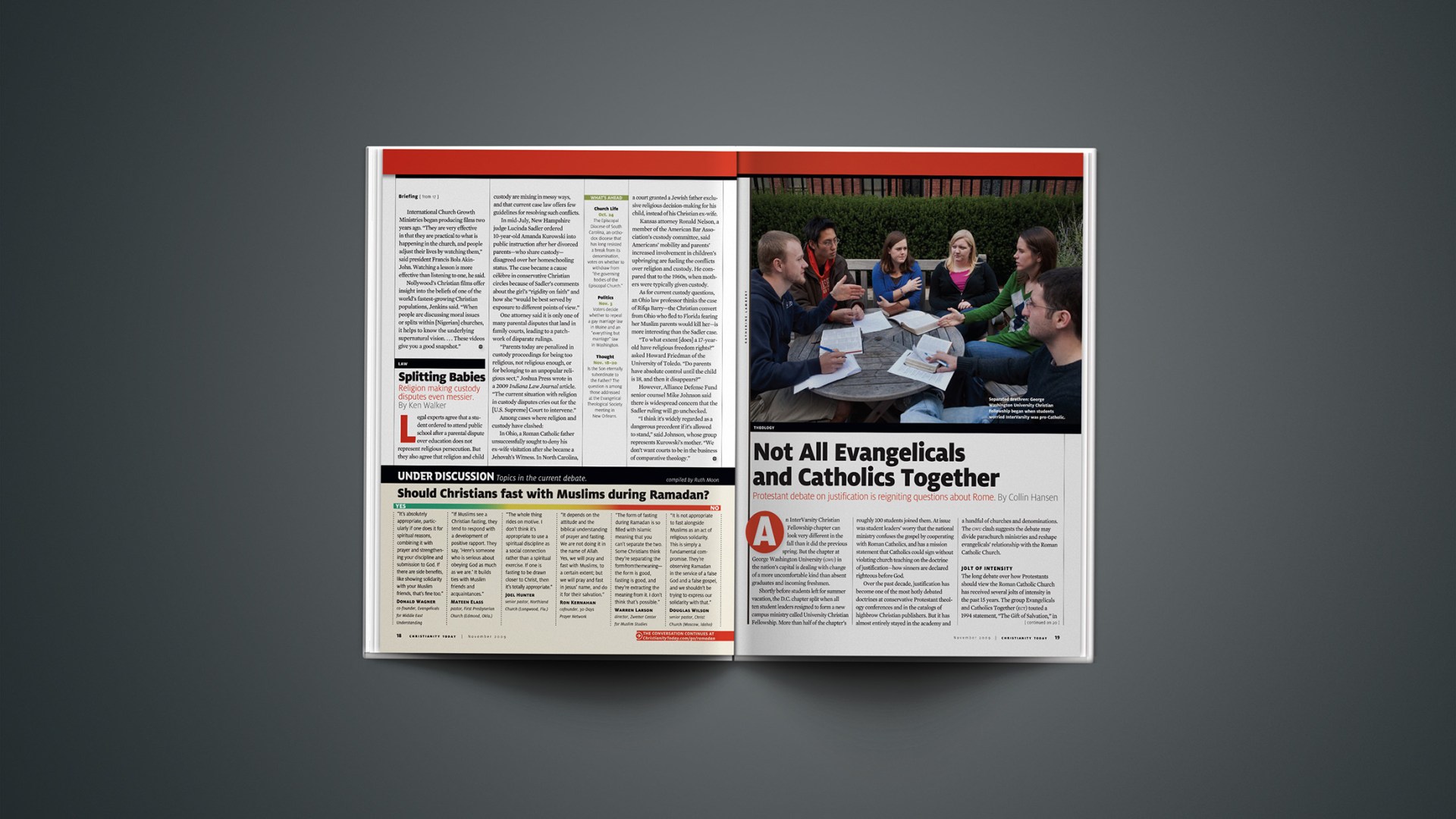"I would say it's absolutely appropriate, particularly if one does it for spiritual reasons, combining it with prayer and strengthening your discipline and submission to God. If there are side benefits, like showing some solidarity with your Muslim friends, that's fine too. It's best not to be bragging about it. (But) it has to be a personal decision." Donald Wagner, co-founder, Evangelicals for Middle East Understanding
"The idea of Ramadan and the feast of Eid is Muslims are asking that they would encounter God more. What that means to them varies from place to place and person to person, I'm sure, and Islam has so many different manifestations, that varies dramatically across the globe. But still—that's something we can agree with, that we pray and get to know God more." Lynn Green, international chairman, Youth With a Mission
"In order to bridge the gap between the East and West Muslim and Christian cultures, rather than condemning and criticizing, here's something very easy that we could do as followers of Jesus that's consistent with the teachings of Christ and the scriptures. Not that we're supporting every viewpoint and doctrine, no—we're supporting them as neighbors in the spiritual journey. We're all on a spiritual journey." Mark Siljander, author, A Deadly Misunderstanding: A Congressman's Quest to Bridge the Muslim-Christian Divide
"There's such fragmentation between the Christian community and the Muslim community that it makes sense to me that we participate in something that is both inherently Christian and, for Muslims, inherently Islamic, to build bridges of peace." Ben Ries, pastor, Sterling Drive Church of Christ, Bellingham, Wash.
"Muslims believe that fasting is an essential component during the month of Ramadan, essential to their obedience to God. So they assume anyone who is seeking to be serious about God will show that dedication by fasting as well. Muslims have a hard time understanding how Christians can be serious about wanting to follow God without also fasting during Ramadan. If Muslims see a Christian fasting, they tend to respond with a development of very positive rapport. They say, "Here's someone who is serious about obeying God as much as we are." It builds ties with Muslim friends and acquaintances." Mateen Elass, Christian from a Muslim family background and senior pastor of First Presbyterian Church, Edmond, Okla.
"If we are using traditional Christian disciplines just as a matter of solidarity then we are missing the point. The whole thing rides on motive. If one is doing it just to be a nice person and identify with a Muslim neighbor, then I don't think it's appropriate, because you're using a spiritual discipline not as a spiritual exercise but as a social connection. If one is saying, 'During Ramadan, I'm going to fast too because that's part of our history and I want to be drawn closer to Christ and be more like Christ,' then it's totally appropriate." Joel Hunter, senior pastor, Northland Church, and member, President's Council on Faith-based and Neighborhood Partnerships
"It depends on the attitude and the biblical understanding of prayer and fasting. We are not praying and fasting in the name of Allah. Yes, we will pray and fast with Muslims, to a certain extent; but we will pray and fast in Jesus' name, and do it for their salvation." Ron Kernahan, joint coordinator, 30-Days Prayer Network
"Christians may fast alongside Muslim friends, either as a gesture of friendship or in order to open dialogue, but not as part of Ramadan itself. Christian fasting is fundamentally different from Muslim fasting. Christians must make clear that their view of God, God's approach to us, and therefore fasting as part of our relationship to God, are each different from Muslim views." Gerald McDermott, Jordan-Trexler Professor of Religion, Roanoke College
"In Isaiah and the minor prophets, you fast and pray to really meet God, to humble yourself and cry out to God … Muslims fast during Ramadan for different purposes. They fast to fulfill the five duties. I'm not against fasting, but I think biblically the reasons for fasting are quite different than those for what Muslims do. The form of fasting during Ramadan is so filled with Islamic meaning that you can't separate the two. I think some Christians today think they're separating the form from the meaning—the form is good, fasting is good, and they're extracting the meaning from it. I don't think that's possible, because the form and the meaning are so closely connected. Warren Larson, director, Zwemer Center for Muslim Studies at Columbia International University
"It is not appropriate to fast alongside Muslims. I wouldn't make a point, if I were in a heavily Muslim state where everybody is fasting during the day, of fixing a hot dog and walking outside and eating it … but to observe Ramadan along with your Muslim neighbors and friends, letting them know that you're observing Ramadan as an act of some sort of religious or spiritual solidarity, is simply a fundamental compromise. They're observing Ramadan in the service of a false God and a false gospel, and we shouldn't be trying to express our solidarity with that." Douglas Wilson, senior pastor, Christ Church, Moscow, Idaho, and senior fellow of theology, New St. Andrews College
Copyright © 2009 Christianity Today. Click for reprint information.












